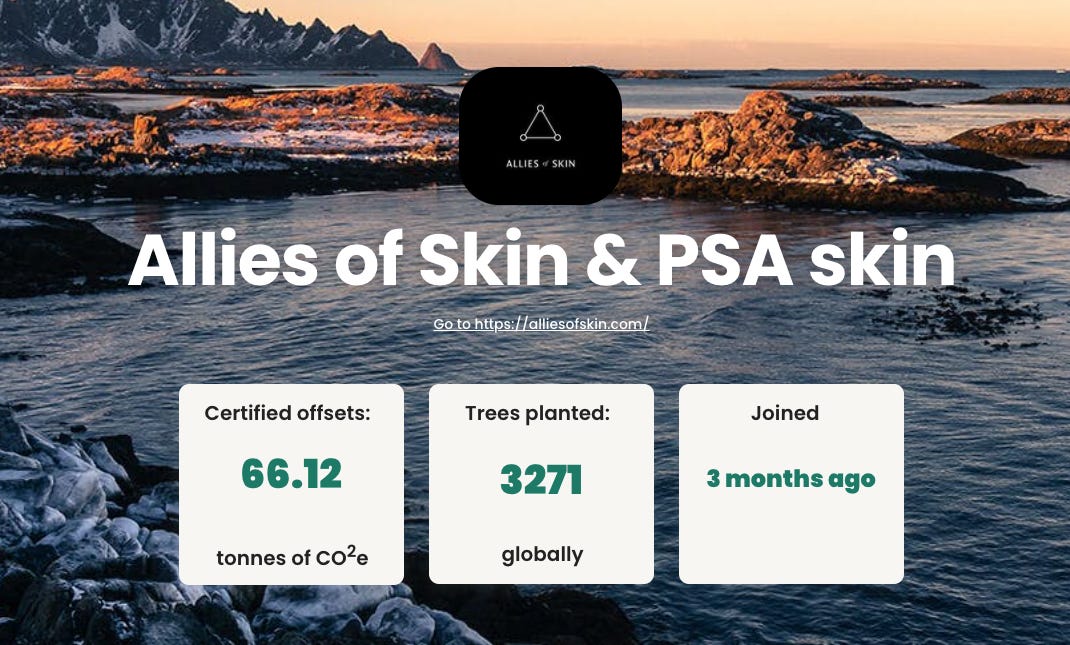🌱 Subscription and Soft Serve: Can Both Be Sustainable?
Featuring Whirli, Bundlee, Jude's, Treepoints and more...
Happy Friday!
This week we take a look at...
What we can learn from the rise of the childcare goods subscription service.
How Jude’s have become Britain’s first carbon negative ice cream company.
In case you missed it: Plastic Credits at the checkout? There's a new wave of offset APIs, led by startups like Treepoints.
> Good News This Week
🎯 Pip & Nut released their new packaging - glass jars that are made from a minimum of 50% recycled glass, and are themselves more widely recycled than their previous 30% rPET jars.
🎯 The Collective have claimed a first with a blended yoghurt that is carbon neutral.
⭐️ M&S are selling heavily discounted 25p extra ripe banana bundles in an attempt to reduce food waste.
⭐️ Sainsburys becomes the first UK grocer to introduce fully electric trucks to its fleet.
⚡️ Hubbub revealed their partnership with BT on a study which discovered that if simple household electricity use changes were implemented, it would deliver 6.6% of the amount that households need to reduce their emissions by to hit the UK’s Net Zero target by 2050.
⚡️ Upstream released Reuse Wins, a report detailing the emergence of a new reuse economy, outlining the potential for 841 million disposable food packaging items to be averted annually.
> Click on each link to read more.
> Quick Take
They grow up so fast: What we can learn from the rise of the childcare goods subscription service.
Nearly two-thirds of UK homes are signed up to a subscription service. Of these, the average number of subscriptions is seven. Nearly one-sixth of UK homes have a child under 5. What are the odds of one of these households wanting a subscription to childcare goods? Don’t worry, we won’t make you do the maths. The message is clear: there’s a prime market screaming out for childcare subscription services, and toy box service Whirli and clothing box Bundlee are heeding their call. They saw the market trend, found a niche with their name on it and made their move. That’s not the only lesson we can learn from these brands. First, let’s take a look at their origin stories.
Bundlee is the UK’s first baby clothing rental subscription. Describing her ‘shock’ at how fast her siblings outgrew clothes, (and how fast they piled up in storage) founder Eve Kekeh decided to tackle the ‘ultimate fast fashion’. Bundlee is marketed as a sustainable option, (using carefully sourced, carbon-minimising fabrics designed to last) but only in part. A big part of its USP is that it saves money and storage space for new parents. Two precious commodities.
Whirli, similarly, flaunts its plastic-reducing environmental benefits, but only in passing. Whirli’s monthly toy delivery and collection service is pushed as an affordable option, a clutter-reducing option and most importantly one that is great for easily-bored children. It’s this that consistently sees them winning consumer awards.
Back to that lesson we promised. Bundlee and Whirli make one thing clear: a circular business model is not only environmentally friendly, but market friendly. Bundlee and Whirli both aim to solve long-standing problems for parents, and tackle wider issues of environmentally damaging consumption habits. This dual purpose helps them carve their own niche, and a high-retention subscription model facilitates their market growth. Brands looking to disrupt high-consumption markets, or capture consumers with a low attention/retention span, whilst maintaining their environmental integrity can take a leaf out of Bundlee and Whirli’s business book.
Don’t want to be a square? Find out about circular business models here and learn more from the Dame Ellen Macarthur Foundation.
Haven’t subscribed to Following the Footprints yet?
> Brand Spotlight
Jude’s: Britain’s first Carbon Negative ice cream.
Carbon negative ice cream? As temperatures rise (have you seen Canada right now?), that sounds like a midsummers dream. Luckily for us, Jude’s are delivering. By measuring, mitigating and then offsetting all greenhouse gas emissions - from their operations right through to their supply chain - they’re a B Corp dairy brand leading the herd.
Measuring: Jude’s have teamed up with Professor Mike Berners-Lee and his team at Small World Consulting to take the most important step in any brand’s journey - measuring their emissions. With ingredients compromising 67.0% of total emissions, and distribution a considerable 12.6%, their impact report provides fascinating detail.
Mitigating: No small feat for a family run business based in the South Downs (UK), Jude’s aim to reduce their carbon intensity by 45% by 2030. As a fast-growing businesses, expanding both in offering and location, that’s a very ambitious target. They’ve worked with Carbon Architecture to build a carbon reduction roadmap, which includes switching to renewable energy, reducing the impact of their packaging, and transitioning to more plant-based products. For many, this last step cannot be ignored. The undoubted impact of agriculture, and specifically dairy, on the environment results in many consumers finding a ‘sustainable dairy-based brand’ an oxymoron. Jude’s aims to overcome this, appeasing many consumers.
Offsetting: For Jude’s it’s not as straight-forward as offsetting the emissions they can’t avoid, and calling it quits. Their careful selection of projects focus specifically on wildlife enhancing and community-centred activities. For example, they work closely with the Woodland Trust and Trees for Life in the UK. Unlike many brands, Jude’s portfolio acknowledges an Achilles heel of offsetting that’s often ignored - UK woodland projects take time to grow and sequester the carbon that brands claim to have removed. To account for this, Jude’s are supporting projects like the Yarra Yarra Biodiversity Corridor in South West Australia - to ensure their money can have a more immediate effect. Why Carbon Negative? They remove 10% more carbon from the atmosphere than they emit. Sounds good to us.





